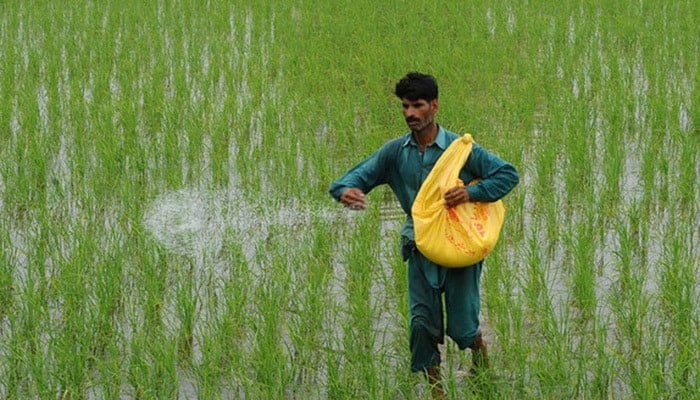Govt to directly subsidise fertiliser cost to help farmers
Musadik Malik disclosed this decision during a press conference on Thursday
ISLAMABAD: The government has announced a significant policy shift aimed at directly assisting farmers by providing subsidies on fertilizers, bypassing traditional channels that often benefit manufacturers more than the intended recipients. Federal Minister for Energy, Musadik Malik disclosed this decision during a press conference on Thursday, citing concerns that the bulk of the support intended for farmers ends up with factory owners rather than reaching those working the land. In addition to subsidy reallocation, Malik unveiled plans to solarize agricultural tube wells as part of a comprehensive initiative to modernize farming practices and enhance energy efficiency in the agricultural sector.
Malik also expressed concerns over monopolistic practices in the seed sector, suggesting that fair competition is essential for agricultural development. “By providing high-yielding seeds to farmers, we anticipate a significant increase in agricultural productivity,” Malik asserted.
Malik announced that gas would be available during Ramazan from 3 PM to 10 PM and from 2:30 am to 8 am. In response to concerns over electricity theft, Malik indicated that load-shedding measures are being implemented in areas where such theft occurs. Malik said that the investigation into the purchase of costly coal by the Sahiwal Coal Power Plant is underway, promising to share pertinent information upon the investigation’s conclusion. Additionally, Malik pledged to collaborate with the Oil and Gas Regulatory Authority (OGRA) to address incidents involving explosions in LPG cylinders.
Additionally, Malik highlighted the government’s initiative to provide small loans for urban areas through banks, underscoring efforts to address economic disparities and promote inclusive growth strategies.
Malik also pledged no further increase in circular debt by the year’s end, aiming to tackle the burgeoning financial burden facing Pakistan’s energy sector. The circular debt soared to Rs2.31 trillion by last year’s conclusion and will be kept at this level by the end of this year. There is a budgeted amount of around Rs300 billion, so the debt will not see further growth. Highlighting the government’s initiatives, Malik articulated plans to fortify electricity consumption, particularly during winter, with a firm commitment to fostering green energy adoption. Additionally, he outlined endeavours aimed at bolstering both electricity and gas production through targeted industrial stimulation. He announced that directives have been issued to public sector oil companies to establish separate entities for renewable energy, aiming to foster cost-effective electricity production while safeguarding the environment. He also assured reforms within the Distribution Companies to bolster efficiency.
Regarding the Iran-Pakistan gas pipeline project, Malik disclosed the commencement of planning, anticipating the imminent launch of the project. Malik also pledged concerted efforts to overcome obstacles hampering the project’s progress. Progress will be soon seen on this project, he added. In response to this issue, Malik unveiled a policy aimed at establishing farm industries in villages across every division and justified saying that 30 to 35 percent of fruits spoil before reaching the market. Banks, he said have been directed to facilitate agricultural industrial loans to support the establishment of these farms, emphasizing the importance of financial assistance in agricultural development. The minister said a plan has been finalized for IT-related training, especially machine learning and artificial intelligence to 0.5 million youth while banks will also be asked to provide loans for the promotion of small and medium industries.
-
 Katie Price Drama Escalates As Family Stays In Touch With Ex JJ Slater
Katie Price Drama Escalates As Family Stays In Touch With Ex JJ Slater -
 Critics Target Palace Narrative After Andrew's Controversy Refuses To Die
Critics Target Palace Narrative After Andrew's Controversy Refuses To Die -
 Sarah Ferguson’s Delusions Take A Turn For The Worse: ‘She’s Been Deserted’
Sarah Ferguson’s Delusions Take A Turn For The Worse: ‘She’s Been Deserted’ -
 ICE Agents 'fake Car Trouble' To Arrest Minnesota Man, Family Says
ICE Agents 'fake Car Trouble' To Arrest Minnesota Man, Family Says -
 Camila Mendes Reveals How She Prepared For Her Role In 'Idiotka'
Camila Mendes Reveals How She Prepared For Her Role In 'Idiotka' -
 China Confirms Visa-free Travel For UK, Canada Nationals
China Confirms Visa-free Travel For UK, Canada Nationals -
 Inside Sarah Ferguson, Andrew Windsor's Emotional Collapse After Epstein Fallout
Inside Sarah Ferguson, Andrew Windsor's Emotional Collapse After Epstein Fallout -
 Bad Bunny's Star Power Explodes Tourism Searches For His Hometown
Bad Bunny's Star Power Explodes Tourism Searches For His Hometown -
 Jennifer Aniston Gives Peek Into Love Life With Cryptic Snap Of Jim Curtis
Jennifer Aniston Gives Peek Into Love Life With Cryptic Snap Of Jim Curtis -
 Prince Harry Turns Diana Into Content: ‘It Would Have Appalled Her To Be Repackaged For Profit’
Prince Harry Turns Diana Into Content: ‘It Would Have Appalled Her To Be Repackaged For Profit’ -
 Prince William's Love For His Three Children Revealed During Family Crisis
Prince William's Love For His Three Children Revealed During Family Crisis -
 Murder Suspect Kills Himself After Woman Found Dead In Missouri
Murder Suspect Kills Himself After Woman Found Dead In Missouri -
 Sarah Ferguson's Plea To Jeffrey Epstein Exposed In New Files
Sarah Ferguson's Plea To Jeffrey Epstein Exposed In New Files -
 Prince William Prepares For War Against Prince Harry: Nothing Is Off The Table Not Legal Ways Or His Influence
Prince William Prepares For War Against Prince Harry: Nothing Is Off The Table Not Legal Ways Or His Influence -
 'How To Get Away With Murder' Star Karla Souza Is Still Friends With THIS Costar
'How To Get Away With Murder' Star Karla Souza Is Still Friends With THIS Costar -
 Pal Reveals Prince William’s ‘disorienting’ Turmoil Over Kate’s Cancer: ‘You Saw In His Eyes & The Way He Held Himself’
Pal Reveals Prince William’s ‘disorienting’ Turmoil Over Kate’s Cancer: ‘You Saw In His Eyes & The Way He Held Himself’




